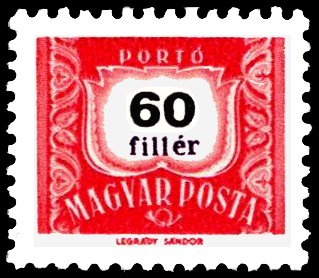Stamp: Postage due (Hungary 1964)
Postage due (Hungary 1964)
01 January (Hungary ) within release Red-Black Postage due serie II. 1964 goes into circulation Stamp Postage due face value 60 Hungarian fillér
| Stamp Postage due in catalogues | |
|---|---|
| Philatelia Hungarica Catalog: | PHu: HU P248IIA |
Stamp is horizontal format.
Designers name at bottom of stamp is 6.8 mm long. Design photogravure; value typography.Also in the issue Red-Black Postage due serie II. 1964:
- Stamp - Postage due face value 4;
- Stamp - Postage due face value 10;
- Stamp - Postage due face value 14;
- Stamp - Postage due face value 20;
- Stamp - Postage due face value 40;
- Stamp - Postage due face value 50;
- Stamp - Postage due face value 60;
- Stamp - Postage due face value 80;
- Stamp - Postage due face value 1.20;
Stamp Postage due it reflects the thematic directions:
A number is a mathematical object used to count, measure, and label. The most basic examples are the natural numbers 1, 2, 3, 4, and so forth. Numbers can be represented in language with number words. More universally, individual numbers can be represented by symbols, called numerals; for example, "5" is a numeral that represents the number five. As only a relatively small number of symbols can be memorized, basic numerals are commonly organized in a numeral system, which is an organized way to represent any number. The most common numeral system is the Hindu–Arabic numeral system, which allows for the representation of any non-negative integer using a combination of ten fundamental numeric symbols, called digits. In addition to their use in counting and measuring, numerals are often used for labels (as with telephone numbers), for ordering (as with serial numbers), and for codes (as with ISBNs). In common usage, a numeral is not clearly distinguished from the number that it represents.

